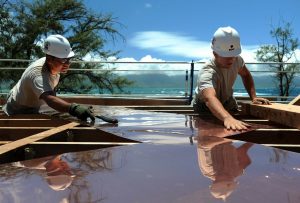Print a Sign-In Sheet | Spanish Version Coming Soon
Construction workers don’t have the ability to work from home and often face a higher risk of exposure to infectious diseases. When working in the construction industry, the following tips can help reduce the risk of exposure:
- Encourage workers to stay home if they are sick.
- Implement a daily screening process consisting of temperate checks and or health questionnaires.
- Provide personal protective equipment such as gloves, goggles, face shields, and face masks.
- Continue to use other normal protective equipment (PPE), necessary to protect workers from hazards associated with normal construction activities.
- Practice and encourage social distancing by doing the following:
- Train workers to always maintain a minimum 6-foot distance from others.
- Develop guidelines to achieve social distancing in high-risk areas such as: choke points, hallways, hoists, elevators, scaffolding, break areas, and buses.
- Develop guidelines to minimize contacts during break periods such as taking breaks in personal vehicles.
- Develop guidelines for minimizing contacts when picking up or delivering materials.
- Consider staggering trades to reduce job site density at any given time.
- Keep in-person meetings (including toolbox talks and safety meetings) as short as possible, limit the number of workers in attendance, and use social distancing practices.
- Address carpooling and develop guidelines to achieve social distancing to and from job sites such as requiring workers to drive separately.
- Where work trailers are used, all workers should maintain social distancing while inside the trailers.
- Advise workers to avoid physical contact with others and direct employees/contractors/visitors to increase personal space to at least six feet
- No Handshaking
- Train workers on how to properly put on, use/wear, and take off protective clothing and equipment.
- Encourage respiratory etiquette, including covering coughs and sneezes.
- Promote personal hygiene. If workers do not have immediate access to soap and water for handwashing, provide alcohol-based hand rubs containing at least 60 percent alcohol.
- Use Environmental Protection Agency-approved cleaning chemicals from List N or that have label claims against the coronavirus.
- To the extent tools or equipment must be shared, provide, and instruct workers to use alcohol-based wipes to clean tools before and after use. When cleaning tools and equipment, workers should consult manufacturer recommendations for proper cleaning techniques and restrictions.
- Clean and disinfect portable job site toilets regularly. Hand sanitizer dispensers should be filled regularly. Frequently-touched items (i.e., door pulls and toilet seats) should be disinfected.
- Consider developing flyers with best practices to be posted in prominent areas.
- Encourage workers to report any safety and health concerns.
KEMI does not assume liability for the content of information contained herein. Safety and health remain your responsibility. This information is to be used for informational purposes only and not intended to be exhaustive or a substitute for proper training, supervision or manufacturers’ instructions/recommendations. KEMI, by publication of this information, does not assume liability for damage or injury arising from reliance upon it. Compliance with this information is not a guarantee or warranty that you will be in conformity with any laws or regulations nor does it ensure the absolute safety of any person, place or object, including, but not limited to, you, your occupation, employees, customers or place of business.

